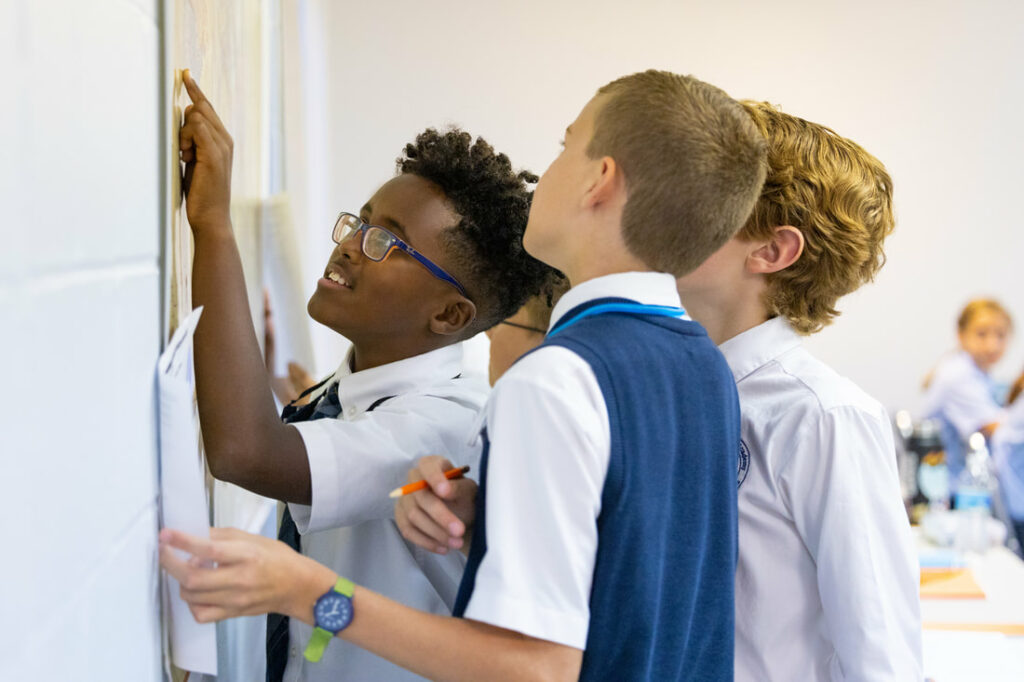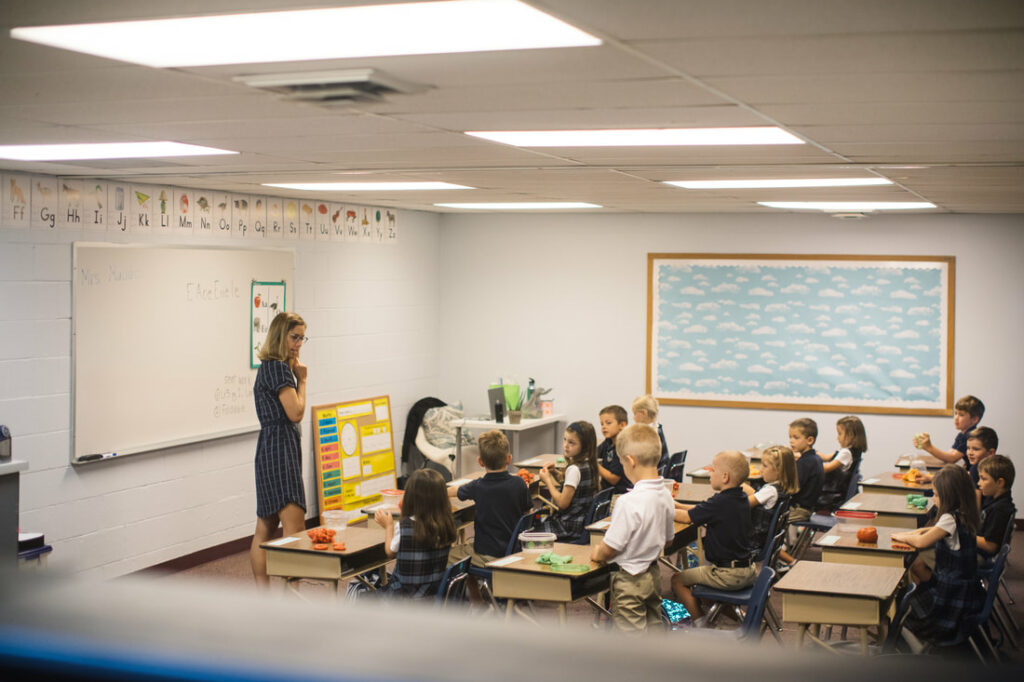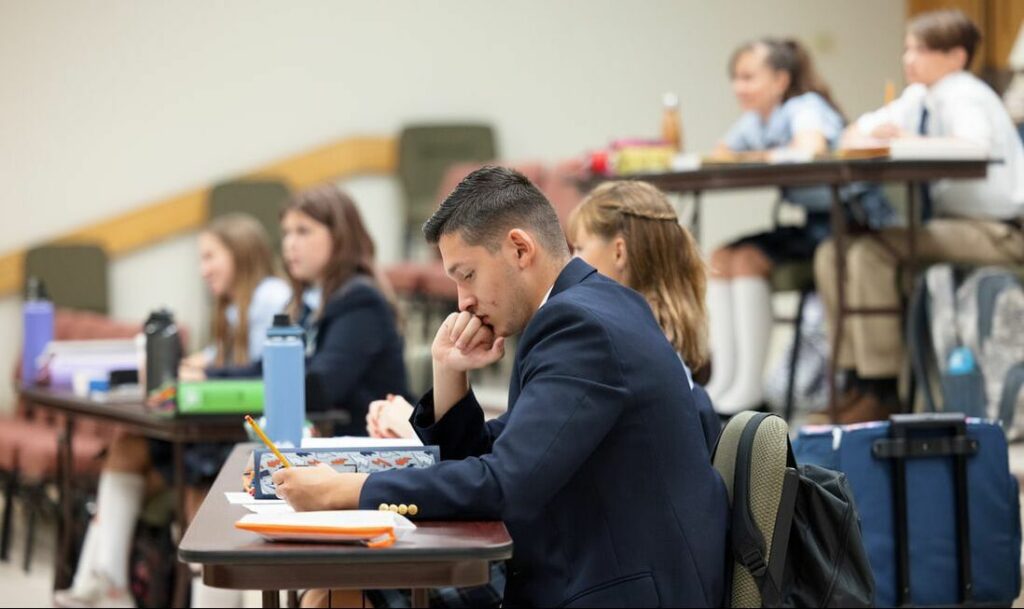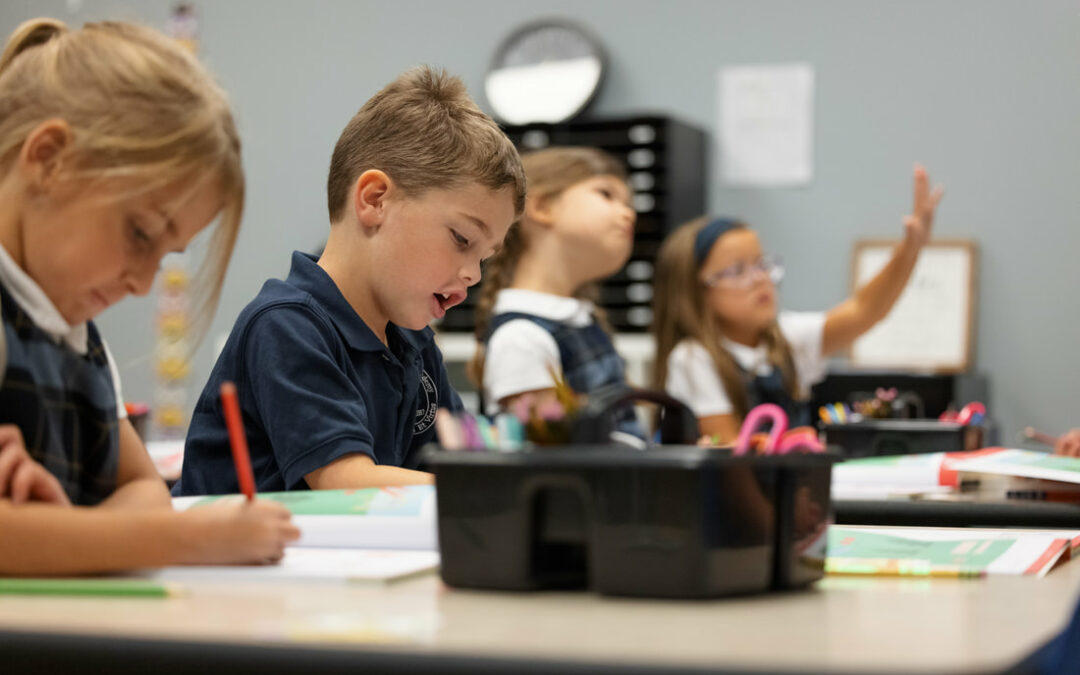Whenever I share about my work or the school, nine times out of ten I hear the question, “What is classical education anyway?” For many people. they have visions of dark, cold, stone buildings with sullen children in pleated stuffy uniforms chanting things in Latin. Some of that might be true- our students do wear uniforms (but we think they look adorable) and they do chant their Latin vocabulary, declensions and conjugations. But their education is far from dark, stone-like, or sullen.
How is a classical school different than a public school, traditional Christian school, or non-classical charter or private school?
In a nutshell:
Classical educational teaches students HOW to learn.
Traditional education teaches students WHAT to learn.
At first thought, skeptics might think this distinction is not a big deal, or maybe it just seems like a lofty thought, but in practical terms there’s nothing different about classical vs. traditional education. However, all of those with an understanding of classical education will tell you it is a very big deal and a very different kind of a big deal.

Traditional Education Teaches Students WHAT to Learn
Traditional schools focus on teaching students WHAT they supposedly need to know and then testing them to see if they measure up. Some examples of this are high-stakes testing, state testing, state standards, “What Your 1st Grader Needs to Know by the end of 1st Grade” type of lists, and the cram, test, forget cycle of the K-12 years.In traditional education, there is very little cross over or connections between subject areas and much of the information spent cramming down their throats for spit back ends up obsolete before they even get to their career job. Traditional education can also be marked by track programs, where the math kids, or the English/writing kids are given classes mostly within their wheelhouse of gifting or comfort and a huge part of educating them as a human, not just as a worker, is missed.”Best practices” for the curriculum, methodology, and the classroom in traditional schools are all centered around mass production of an “educational product,” i.e. test scores, all of which to accomplish, at best, means very few teachers are passionate about their content, and the content must be taught to the low-average of the middle. There is little time for instilling a love for learning and growth when there are so many benchmarks to meet and so many children to try and force to meet them.
So, what about classical education?
Classical Education Teaches Students HOW to Learn
Did you know that there is a time-tested process in which people learn? Did you know that “learning how to learn” is actually a skill? Classical schools focus on teaching students HOW to think. Classical education seeks to produce students who possess a lifelong passion for learning, who are effective thought leaders, who communicate well, and with confidence, and are able to express themselves logically and persuasively.
It’s not about teaching to the test or teaching to the career. Yes, our students go through science, math, writing, language requirements but they do so through a classical education “how to learn” grid, Teaching students HOW to learn the material in front of them is priceless. This means they will possess the ability to learn almost anything placed in front of them. This is very different than telling students, “THIS exact material is what you need to KNOW.”
Our process starts in the Kindergarten year teaching students the process of how to learn anything, how to make connections across all disciplines (as well as in life), and how to communicate those connections. This process happens over and over again all the way through 12th grade. Innovation and entrepreneurial advancement happen within the connections between knowledge, not in the “What Your Student Needs to Know” about each subject area.

So, what does it look like? What does it look like, practically, to teach students how to learn?
First of all, our classrooms operate much like any other school classroom. There are desks or student tables and chairs, coat racks, school calendars, name tags and line leaders, recess, lunch rooms, lockers, and after school electives. If you didn’t walk in during something like recitation hour and had no prior understanding of classical education, you would assume this was any old classroom.But if you stopped in and stayed for a few days, weeks, and months you would see something very different. You would see students engaging in the three specific and distinct practices of “learning how to learn” as they work through their class material. In classical school we call this “how to learn process” the Trivium.
The Trivium (or how to learn) is in three parts: grammar, logic, and rhetoric.
Grammar
This is the first part of how to learn and it is characterized by memorizing a broad range of facts and soaking in knowledge. The grammar of any subject area is its facts, its fundamental parts. For example, the grammar of spelling would be the rules of spelling, phonics, etc. The grammar of math would be the memorization of math facts and math formulas. The grammar of English would be the parts of speech such as nouns, verbs, direct objects, prepositions, etc. The grammar of science would be the facts about the various science fields of study such as the planets in the solar systems, the names and functions of the systems in the body, the parts of a plant, the periodic table of elements, the parts of a cell. The grammar of history would be the stories of history- the location, the event, the dates, the people, etc. The first thing a person should do when learning anything new is learn the facts. You can’t do anything else until you learn the grammar of what you are studying.
Logic
This is gaining understanding by asking “how, what, and why” of the grammar that was previously learned. When students get to the logic phase of how to learn, they are looking back at all the grammar, the foundational pieces they learned, and they ask how, what, and why in order to begin to make sense of the knowledge they have. They look at where they need to fill any missing grammar gaps, and extend themselves with further compounding questions. In this logic stage, we have to teach students the rules of logic, how to argue, how to recognize fallacies, non-truths and truths, otherwise this stage is just teaching students to simply listen to and banter with their own foolish and immature ways of answering the how and the why. These are skills that need to be taught. One look at media and politics today and you will see exactly why this skill of logic about facts is needed! The second thing a person should do when learning something new is to take the grammar of what you are studying and ask “how, what, and why” and begin to ask and answer questions using logic and sound reasoning.
Rhetoric
This is the “and what does it mean” and “how do I express that” part of the learning process. We all know people who have a lot of knowledge (grammar) and ask a lot of questions (logic) but they have no idea what to do with it, how to integrate it, apply it, communicate it, or how to create innovation from it. This is the pinnacle, the top tier of the learning process, and sadly most high school and college students never even reach this point in their process of seeking to be educated. The third thing a person should do when learning something new is take the tools of logic, apply them to the foundations of grammar, and begin to apply, integrate, and communicate how it pertains to and affects life.

Here is a practical example of what this might look like:
Let’s take the topic of the War of 1812.
At the grammar stage, students would be learning all about the War of 1812. They would read the stories surrounding it, memorize the names, dates, and places that pertained to the War of 1812, and basically be able to give all the foundational facts about the War of 1812. At the logic stage, students would circle back to all that information they already learned, memorized, and absorbed about the War of 1812 and they will begin to ask how and why questions. “Why did the War of 1812 start?” “How did the war end and why?” along with all kinds of other questions that will bring clarity and understanding to the facts learned about the War of 1812. At the rhetoric stage, students would begin to integrate that grammar and logic, seeing where else in history or life we see similar patterns or outcomes, and what those might mean for our present every day life? This learning is often displayed in persuasive speaking or writing. This is where students pursue wisdom, not just understanding. For what good is knowledge and understanding, if you don’t know how to use it to positively affect your life and the lives of those around you.
All three of these phases- grammar, logic, and rhetoric are used to teach students how to learn. They can be applied almost anywhere. It seems simple, but in all the noise of every “next new thing” in education trends, we have lost the ability to think for ourselves, to reason logically and persuasively, to maintain a love of learning, and to graduate compelling thought leaders who possess the gifts and abilities needed to shape culture and bring new innovative work to mankind.
So if you really sat in our classes for any extended amount of time and watched our students interact with their teachers, peers, and learning material, you would see them in and out of this “how to learn” process all day long. When you grow up learning this way, you think nothing of it when your boss plops down a new program (or an entirely new position in a completely different field) in front of you and tells you learn it, learn it quick, be effective, and make sure you can teach it to the next guy that comes behind you. Oh, and don’t forget to add innovation to it by thinking of how to make it better and more efficient. And the classically educated student has all the tools necessary to accomplish that and more. After all, he was taught how to approach new information, how to ask the right questions and answer them with logic and sound reasoning, and he was taught how to apply and integrate what he learned. He’s been doing that since he was five years old! No big deal.
Any company, innovator, or world changing organization wants an adult who can learn anything put in front of them, who can think and reason logically and persuasively, and who possess the skills to effectively bring about change and growth.
So the next time someone asks you, “what is classical education anyway?” You can tell them, in a nutshell, classical education teaches students HOW to learn, not WHAT to learn.



Hi there ,
Congrats on this presentation of what is classical education. As a life long learner I am aware that the “How” is more a staple learning than the “What” in regards to your work going forward it would be fantastic to see more books on the subject with above mindset mentioned. Keep up the amazing work kind regards Mr Worrell Robinson
Fantastic! At my age as I read the article I found more reasons than I ever had thought of to thank God for my education so many years ago, for the teachers who I now understand used the classical model of education in the classes I engaged in. Now there is hope for my great-grandchildren.
Gratifying to see that classical education is attracting attention again. I should’ve had a classical education. I failed out of the standard education system because I could never connect what I was learning to “how, what and why”. It made life very difficult but I never stopped being a life long learner, and am well and truly out of the box now, much to the discomfiture of my peers.
I think a lot of the world’s problems would disappear if this was the standard education. And, you’re right: I see all the errors of logic being employed by everyone now, across the board. Makes rational discussion about anything virtually impossible.